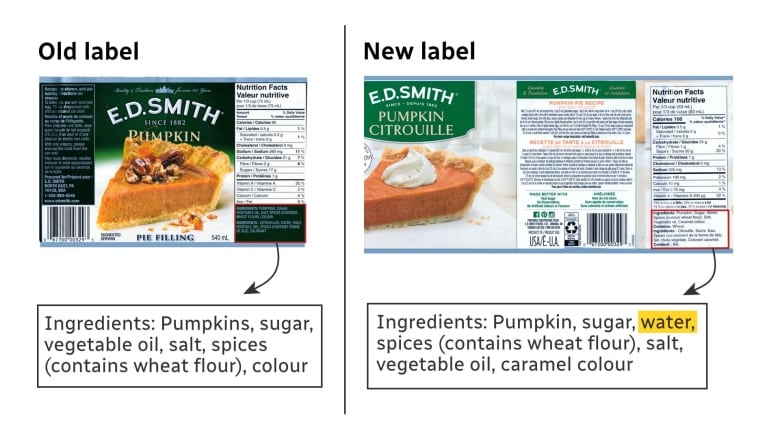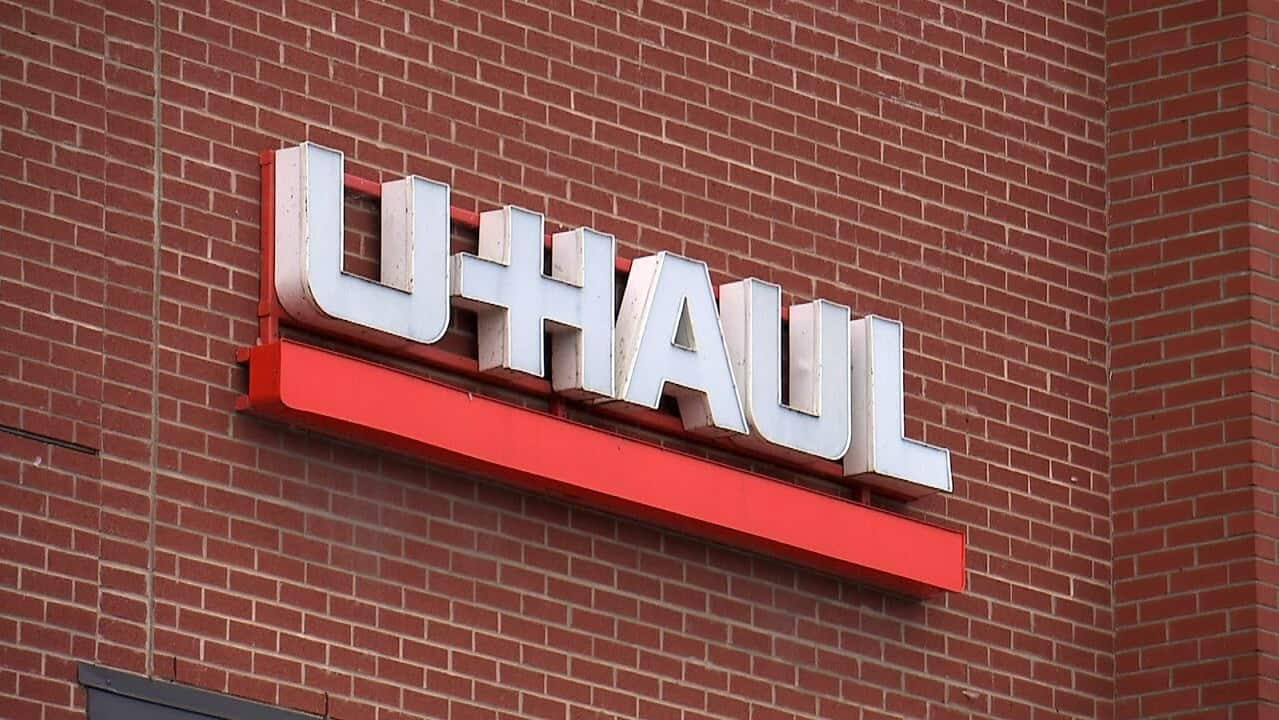
Miss something this week? Don’t panic. CBC’s Marketplace rounds up the consumer and health news you need.
Want this in your inbox? Get the Marketplace newsletter every Friday.
How inflation might be sneaking into your cupboards, without you even knowing it

The constant talk about inflation has a lot of us feeling like we’re stuck in the middle of a storm. But Marketplace‘s latest investigation is providing tips on how to weather it.
Grocery prices have increased at a faster rate than overall inflation, according to Statistics Canada, so step one is to check labels before you buy.
Take E.D. Smith pumpkin pie filling, for instance.
The price of the canned good has increased by more than 50 per cent since January 2021. At that time, the 540 ml can of pie filling was $3.99. In October 2022, it had gone up to $6.03 at Loblaws stores in Toronto.
Betty Henry, a consumer in London, Ont., has been using E.D. Smith pumpkin pie filling for 50 years to make pies for Thanksgiving. Aside from the price, she says she noticed a difference in the filling as soon as she opened the can this year.
“It was more pumpkin soup than pie filling,” Henry said.
The pie filling used to list vegetable oil as its third ingredient. Now, the third ingredient is water.
Winland Foods recently bought E.D Smith, and its CEO, Eric Beringause, says that the change happened under the previous ownership so he has no knowledge of the rationale. He told Marketplace that he would “personally look into” the ingredient change. Read more.
Aside from checking ingredient labels, the latest Marketplace investigation digs into how to spot shrinkflation, how to dodge tipflation, and how to shop smarter amidst the rising prices. You can watch “The Inflation Survival Guide” anytime on CBC Gem.
This renter found out that a ‘guaranteed’ U-Haul reservation isn’t actually guaranteed
One man found out the hard way that a having a reservation for a U-Haul vehicle doesn’t necessarily mean the company will have a vehicle for him. Sam Everitt was forced to drive 600 kilometres round-trip to find a moving truck, after his local U-Haul told him the truck he’d reserved months in advance wasn’t there.
Sam Everitt was well prepared for his move from Montreal to Toronto.
He reserved his truck nearly four months in advance. He received reassuring emails from U-Haul about his “guaranteed” reservation.
But when Everitt showed up at the Montreal location to pick up his truck on the afternoon of his booking, staff told him there was no truck for him — and their explanation, he says, was baffling.
“I was in shock. I remember asking what the purpose of the reservation was? They told me that my truck was reserved for that location, but that it hadn’t been assigned to me, whatever that means.”
U-Haul’s website promises if the company is “unable to meet [a customer’s] preferred time, place or size,” it will pay $50 and “still attempt to fill the reservation.”
But that wasn’t Everitt’s experience. Instead, he says staff left him scrambling for a Plan B.
As it turned out, the only truck available was some 292 kilometres northeast of Montreal, in La Tuque, Que. The drive would take about three and a half hours each way.
But the clock was ticking. He had to be out of his apartment for the arrival of the new tenants.
His moving ordeal left him more than $400 out of pocket — for the rental car, gas and food — and sleepless for his drive to Toronto.
In a statement to Go Public, U-Haul said sometimes it’s necessary to send a customer to the “next closest location” to get a vehicle.
It acknowledged the distance Everitt had to travel was “unfortunate and extreme” and said it offered him a $250 certificate. The company declined to reimburse Everitt for his extra costs. Read more.
Couldn’t get Taylor Swift tickets? You’re not alone.
Some Taylor Swift fans are expressing outrage toward Ticketmaster after a chaotic release of tickets for the upcoming Eras tour, marred with long waits, limited supply and technical difficulties.
They can’t just “shake it off.”
Millions of Taylor Swift fans swarmed the Ticketmaster website on Tuesday for a pre-sale, seeking seats for her first tour in five years, causing periodic outages and long online waits that often ended in disappointment.
The ticket-selling site, owned by Live Nation Entertainment, Inc., told fans on Tuesday morning, via a statement on Twitter, that it was experiencing “intermittent issues” that the company was “urgently” working to resolve. Ticket sales for West Coast shows were delayed by three hours.
A general public sale scheduled for Friday was then cancelled Thursday.
Later, Ticketmaster tweeted that there had been “historically unprecedented demand” for Swift’s The Eras Tour — her first since 2018 — from millions of people.
Fans reported waiting in online queues for up to eight hours, and many finding they were too late to purchase tickets, which cost between $49 and $449 US each.
A Ticketmaster spokesperson said the number of people who registered for the early sale was more than twice the number of tickets available, and that millions of others also jumped online to buy.
“This caused some delays for fans, which we know is frustrating and we worked as quickly as possible to adjust some on sale times to manage the volume, and queues are now flowing,” the spokesperson said.
Tuesday’s pre-sale was the most tickets ever sold on the platform in a single day, according to a Ticketmaster statement. Read more.
If you think housing prices are high, wait ’til you see the rental market

While the dramatic impact of higher lending rates on the housing market has been well documented, what’s happening in the rental market hasn’t gotten nearly as much attention.
As anyone who has signed a lease — or tried to — lately can attest, rent is going up across Canada at an unprecedented pace.
According to data from rental accommodation website Rentals.ca and analyzed by data firm Urbanation, the average rent in October across Canada was $1,976 across all types of properties, from bachelor apartments all the way to three-bedrooms. That’s an increase of 11.9 per cent, well ahead of Canada’s inflation rate of 6.9 per cent.
Atlantic Canada has seen rents rise at the eye-watering pace of 32.2 per cent in the past year. Ontario, British Columbia and Alberta have seen increases of 17.7 per cent, 15.1 per cent and 13.2 per cent, respectively.
Other regions experienced increases of slightly below the national average, but in just about every market across the country, tenants are facing a huge jump in the cost of keeping a roof over their head. Read more.
Do you have a rental horror story to share? We want to hear from you. Email us at [email protected].
What else is going on?
Loblaws profits are up 30% — despite inflation
The company said sales were led by strong performance at its discount grocers, and booming sales of high-margin items like beauty products and cold medications.
The shortage of kids’ painkillers is getting worse, and some adult meds are running short too
Some store shelves are depleted of children’s allergy medication, adult cough and cold syrup, eye drops and even some oral antibiotics.
The average home price is down more than $170K since February
The volume of home sales is down by more than a third, compared to the boom times of last year.
Marketplace needs your help

Are you in the market for a diamond ring? Picking the perfect stone can be less than crystal clear! Whether you’ve got a story about your own diamond hunt, or you’re just starting the journey, Marketplace wants to hear from you! Email us at [email protected].

Catch up on past episodes of Marketplace on CBC Gem.

